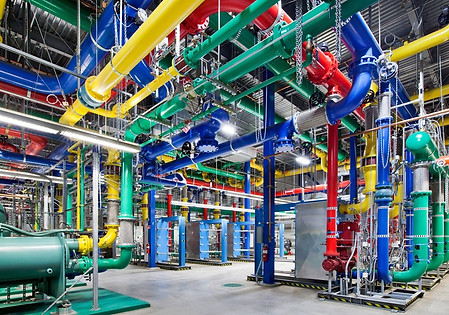______________________________________________________________________________________________________________________________
Radu Tîrcă and Ștefania Hîrleață are students at University of Architecture and Urbanism 'Ion Mincu', Bucharest. At present, they lead their theoretical research on the subject of thermal towns and diploma projects in Govora Baths under the guidance of Stefan Simion, Irina Tulbure and Ilinca Paun Constantinescu. As students, they won second prize and best student project in a BeeBreeders international architecture competition - Mango Vynil Hub, third prize in a Zeppelin national competition - Prototip pentru comunitate, as well as other mentions in other competitions.

Google Servers
Is the (super)market (post)modern?
E m i l B u r b e a
Just for better understanding I shall rephrase: Is the market Super and the Modernity done?
The market is Super, as you have seen in the Mazzocchioo #3 issue. As many contributors have pointed out, it contains a strange mixture between function and beauty, mind and body, need and desire or between present and history. It pre-existed from ancient times, but we can only test its modern infrastructures spread throughout Bucharest’s urban structure, as sensorial and social condensers as well.
On the other hand, I understand that Modernity – the use and glory of Rationality throughout the world – has shifted its course at its own expense. As Ford invented the standardized production line, the Overproduction Crisis (1929-33) restructured the world: the focus transferred from the production techniques to the buyers needs as Marketing had appeared. Consequently, a kind of gap developed between the product itself (noumen) and its commercial appearance. The world itself became a universal spectacle, a formal play among these thin surfaces that comes to structure social relations too as Guy Debord[1] or Jean Baudrillard[2] have pointed out.
Probably the Supermarket is one of the authentic offspring’s of this Society of the Spectacle®, together with the Shopping Mall, as both values commercial appearance, shining and glittering to tease the buyers’ lust instead of provoking genuine experiences or human interactions. Even if Modernity has not ended its course, for we are not ready to give up to Rationality, it seems that the Marketplace was abandoned as just a historical form, not being able to tackle social relations anymore.
[1] Guy Debord – La société du spectacle, Paris: Buchet-Chastel 1967
[2] Jean Baudrillard – La Société de consommation, Paris: idées/Gallimard, 1970
Emil Burbea-Milescu is a practising architect, senior partener at Republic of Architects. In the last ten years he enjoyed beeing invited as teaching assistant at UAUIM. In both postures, he promotes the necessity of a permanent negociation between the public and private interests in order to find the right configuration of the built environment. His phd thesis was inspired by the “Heterotopia” of Michel Foucault – a practical tool to infiltrate or detour the mainstream power authority, hoping to find new and candid human interactions.



